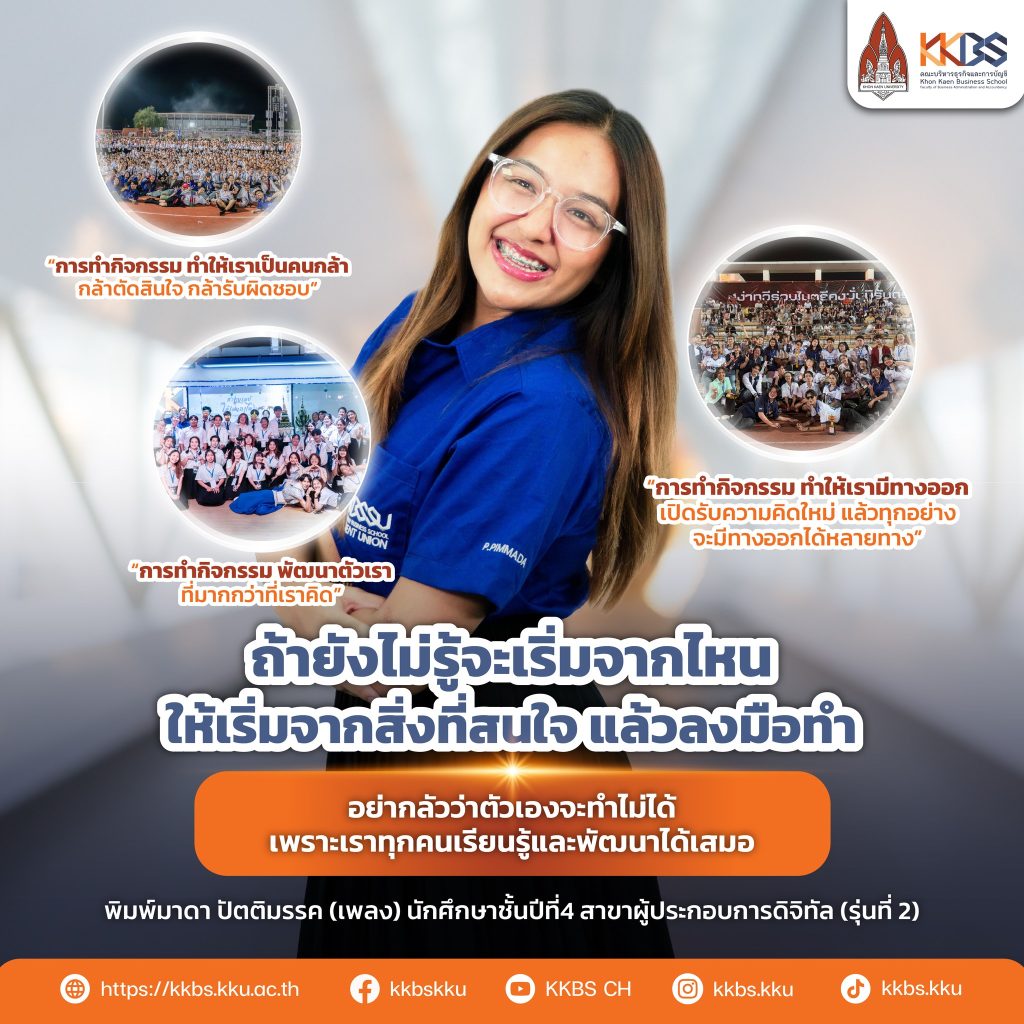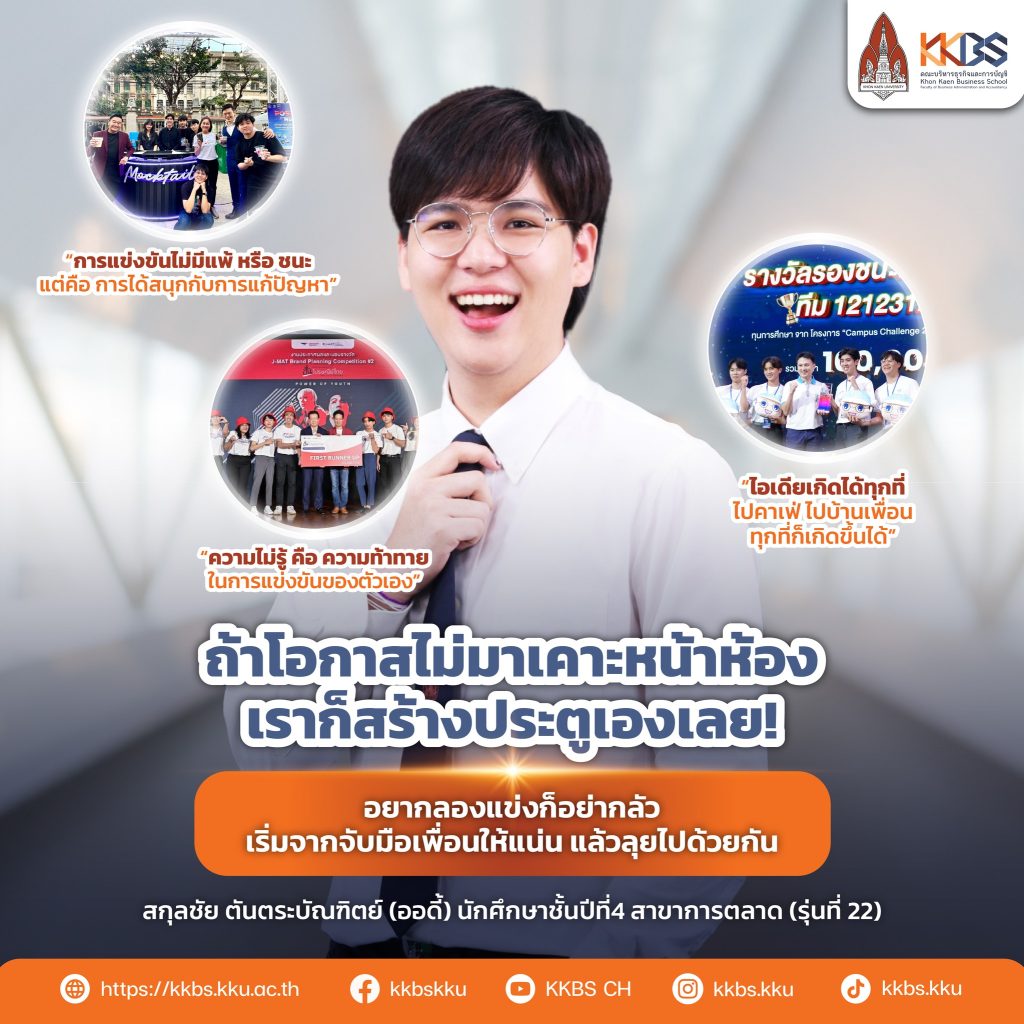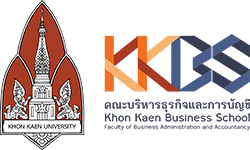
“The great idea does not necessarily have to begin in the classroom.” Although vacation time may seem like a break from learning in the classroom, for many students, it becomes the starting point for valuable lessons in the real world. Activities serve as the best experimental grounds, whether through internships, participation in competitions, or initiating small projects. Every moment is an opportunity to learn, take action, and develop essential life skills, including confidence in decision-making, communication, teamwork, or problem-solving in challenging situations.
In this special feature, we introduce three students from the Faculty of Business Administration and Accountancy, Khon Kaen University (Khon Kaen Business School: KKBS), namely Ms. Pimrada Pattimak (Song), a third-year student in the Bachelor of Business Administration program with a specialization in Digital Entrepreneurship, and former president of the KKBS Student Club for the academic year 2024; Ms. Chonnipa Nisyant (Pearl), a fourth-year student in the Bachelor of Accountancy program; and Mr. Sakulchai Tantabundit (Audi), a fourth-year student in the Bachelor of Business Administration program majoring in Marketing, who have made the most of their time outside the classroom. They did not wait for opportunities to knock at their door but chose to open the door and seek self-discovery through activities, internships, and challenging competitions, along with lessons they wish to share with the new generation looking for the starting point of their own paths.

Ms. Pimrada Pattimak (Song), a third-year student in the Bachelor of Business Administration program specializing in Digital Entrepreneurship, former president of the KKBS Student Club for the academic year 2024.
Q: What prompted your interest in participating in this competition/activity/internship?
A: The interest began from my enjoyment in engaging in activities since my first year. I participated as a team member in several projects organized by the Student Organization and felt that the activities offered more than expected. It was not just about organizing events but gaining experiences and opportunities to learn from peers, seniors, and many surrounding people. As I entered my second year, I decided to apply as a subcommittee member of the Student Club, allowing me to experience a more systematic work process where I practiced management skills and problem-solving. By the time I reached my third year, I felt the need to build upon and develop what I had learned, so I decided to run for president of the KKBS Student Club to contribute to advancing the faculty’s activities and creating good experiences for my peers. Another important reason was that I viewed activities as a great opportunity to train myself, whether it be teamwork, problem-solving, or management skills, all of which are necessary skills that can be applied in real-life situations.
Q: While working on projects/activities/internships, have you ever encountered a block in your ideas or obstacles? How did you overcome those issues?
A: Yes, especially during the planning stages of major events such as freshmen orientation and the Colorbase Festival. Sometimes I encountered unforeseen problems, like budget constraints or coordinating with multiple parties having differing opinions. When ideas hit a deadlock, the student club would talk with friends or seniors who had previous experiences. An important lesson learned is that we have to be brave to try, to adapt, and to accept feedback from those around us.
Q: Is there a place or situation that unexpectedly sparked a great idea for you?
A: The idea for the “Malaneet” activity came during a routine stroll around the faculty with the student club. I noticed that many juniors, especially those in their first year, were not familiar with key locations within the faculty or the functions of various departments. After considering this, the idea emerged to create an activity that guided juniors to explore the faculty while introducing them to critical operational areas, helping them understand the faculty’s structure more easily. From this idea, we further developed activities that incorporated important points, with each stop featuring business-related activities, such as the 4Ps (Product, Price, Place, Promotion), to ensure that juniors could learn business concepts while having fun, making the activity more than just a casual tour of the faculty.
Q: What are the takeaways from this competition/activity/internship that you believe you will apply in the future?
A: I gained numerous skills, especially in “management,” from prioritizing tasks to teamwork. I believe these skills are applicable in both daily life and in professional settings. Another important aspect is “communication and negotiation,” as engaging in activities requires interaction with various parties, from students and professors to other organizations, which taught me that effective communication can facilitate smoother operations. Finally, there is “confidence.” Leading activities made me more decisive and responsible, which is essential for future job environments.
Q: For those who wish to try doing similar activities but are unsure where to start, what advice would you give?
A: If you are uncertain where to begin, I recommend “starting with your interests.” If you enjoy event planning, try applying to be a part of your faculty’s activity team. If you want to develop yourself, consider joining a competition or an internship project. Importantly, “don’t be afraid to try.” Many people worry that they may not succeed, but the reality is that we can all learn and improve ourselves. The crucial part is to start. Finally, KKBS offers numerous opportunities for students to participate in activities. If you are interested in something, don’t hesitate to reach out to your professors or the seniors at the student club.

Ms. Chonnipa Nisyant (Pearl), a fourth-year student in the Bachelor of Accountancy program.
Q: What prompted your interest in participating in this competition/activity/internship?
A: It started when I was deciding whether or not to engage in co-operative education during my fourth year, second semester. I consulted with professors, friends, and my family about whether or not I should pursue an internship since I did not have a clear plan for the future and lacked self-confidence. Ultimately, I decided to intern at Nakhon Accounting Support Company Limited during the vacation period to determine if I was genuinely interested in this field and whether I would be capable of handling future co-op tasks in my fourth year, as well as to gain work experience and effectively utilize my available time during the break. This was a way for me to overcome my fear because once I graduate, I will have to face society. Thus, this internship became a test for me beforehand.
Q: While working on projects/activities/internships, have you encountered a block in your ideas or obstacles? How did you deal with them?
A: Yes, particularly during the initial phase of my internship. There were several seniors already interning at the company who knew each other and attended the same university. As I entered, I felt a bit anxious and unsure of what to do. At times, while communicating, I was hesitant and reluctant to express my opinions. However, as time passed, I felt that I was able to adapt better, communicate, and engage with the seniors at the company. The problems I encountered primarily revolved around the work itself and communication, as the supervisor did not sit down to explain everything; I had to attempt to learn independently before asking for help. Of course, I made mistakes, but I tried to resolve problems on my own before reaching out for assistance from the seniors.
Another incident involved handling company accounting, as the firm undertakes accounting assignments for other companies. I was assigned responsibilities for the accounting of one company, but the outcome revealed errors on my part. Although the supervisor did not reprimand me, I felt disheartened and disappointed in myself during that period. I struggled but motivated myself to keep going to avoid repeating the mistakes. I attempted to reduce the pressure I placed on myself and sought clarification whenever I was unsure. After some reflection, I realized that I had been too hard on myself, worrying that I might hinder the seniors’ work. Consequently, I began to enjoy my work more and sought help from the seniors more often.
An important lesson I learned from the internship and the obstacles I faced is that I should not pressure myself excessively. Everyone can make mistakes, but it’s essential to rise up after falling, correct errors, and not feel obliged to shoulder everything alone. If something is genuinely overwhelming, it’s okay to ask for help. Sometimes, our real obstacles stem from our fears and thoughts that block us from connecting with others.
Q: Is there a place or situation that unexpectedly sparked a brilliant idea for you?
A: It was during a moment of self-reflection regarding the challenges I faced and the free time I had after work. It felt like I was contemplating various things that had occurred. As previously mentioned, I realized that a significant obstacle for me was my mindset. Thus, I began to let go of past mistakes and tried to avoid negative thoughts. It may sound odd, but I encouraged myself and reminded myself that I could do it, that making mistakes was acceptable, and that I needed to be more cautious. I also appreciated myself for my efforts. Additionally, I sought advice from my mother after returning from work, given that 1. she has more experience in the working world than I do, and 2. she is someone who continuously supports and listens to me. I decided to share my experiences with her, which led to ideas for my self-development and gradually learning from my mistakes.
Q: What are the takeaways from this competition/activity/internship that you believe you will apply in the future?
A: The skills I learned from this internship include communication and problem-solving, as well as managing my negative thoughts during work. This internship allowed me to understand that accountants have to work on every aspect, whether it involves reviewing documents that require caution, recording data using software that requires meticulousness, or team communication where collaborative support is crucial. One should not feel pressured to try to accomplish everything independently without confidence. For me, I consider this internship a valuable experience that helped me know more about myself, connect with others, adapt to social settings, and learn from my own mistakes. Working in the real world is quite different from studying in several respects, but it’s an exciting test that teaches and helps us improve. The skills I’ve acquired have enhanced my understanding of accounting software, which I can apply and integrate with my university studies, providing me with a clearer understanding of my field and my career path. This internship has undoubtedly shifted my perspectives and views regarding working in this field, shaping it into a fruitful experience for learning and self-improvement.
Q: For those who wish to try doing similar activities but do not know where to start, what advice would you give?
A: For any juniors who are hesitating or unsure about whether they should undertake an internship during the vacation, I highly recommend giving it a try. Interning is not as terrifying as it may seem. In my view, it’s often our own thoughts that hold us back. I suggest you open yourself up and challenge your beliefs. Learning from real work experiences significantly helps across various aspects, particularly in making decisions for future work and study. Besides acquiring knowledge and good experiences, you may also gain new friends and mentors. You can research further or consult your professors, as well as seek advice from the seniors. If there is something you want to try, you should do it. Through experience, you’ll find out if you like it or if it’s suitable for you. Learning is not a frightening experience. Many people are willing to support you, but one thing we should not forget is ourselves. Overcome your personal limitations, learn new things that come your way, and develop yourself into the best version of yourself. I’m sending encouragement to all juniors.

Mr. Sakulchai Tantabundit (Audi), a fourth-year student in the Bachelor of Business Administration program majoring in Marketing.
Q: What prompted your interest in participating in this competition/activity/internship?
A: To answer this, I need to go back to the first competition I participated in, which was the Global Case organized by Alibaba. It started in my first year, first semester, with three friends who were also studying marketing. To be honest, I would say that we had just begun our journey in the field of marketing without having taken any marketing courses yet. However, driven by curiosity about what marketing would be like in real life, it became the starting point for our team competition. More importantly, it felt like a chance to have fun with friends, explore ideas, and tackle different roles and problems. It embodies the phrase “learning outside the textbook.” It was a challenge awaiting us. The more we dug, the more we explored and competed, the more we encountered diverse challenges and different problems to solve. “The unknowns that lie ahead” became the exciting aspect that brought us together.
Q: While working on projects/activities/internships, have you experienced any deadlocks in your ideas or faced obstacles? How did you overcome them?
A: Yes, I have encountered situations where ideas were stagnant, or sometimes faced other obstacles beyond my control, such as creative blocks during the work that required intense creativity. At that moment, I must say it was quite challenging, and it still is, haha. However, I persisted by starting with those closest to me, which were my friends. They helped me get through it by bringing together diverse thoughts and strengths, giving rise to a broader perspective that often led to breakthrough ideas. Occasionally, I would consult professors and seniors. We would gather at three or four in the morning discussing ideas, offering fresh perspectives. However, it’s essential that the essence of our work remains strong; otherwise, new obstacles could lead to a lack of direction in our plans. But once we overcome such hurdles, we realize that each plan reflects distinct thinking perspectives. Winning the competition isn’t the only goal; it’s about enjoying the learning experience along the way.
Q: Is there a place or situation that unexpectedly sparked a brilliant idea for you?
A: Ideas can truly emerge anywhere. For instance, in everyday spaces I work in like coffee shops or friends’ houses, discussing ideas over meals can sometimes spark insights. Participating in community projects, like the Young Development Project by GSB, also gives birth to new ideas through discussions with community members. Additionally, I once took part in a hackathon with friends, and ideas came to me during a casual walk. At that time, I was visiting the engineering faculty and found inspiration while walking around the building. Sometimes, I’d have moments of clarity while thinking in the restroom, where I could say, “Oh, here’s a good idea.” I even find that ideas come to me in dreams after contemplating certain matters before sleep, such as brand development strategies for SCG, which emerged as a result of insights garnered in dreams. Upon waking the next day, I would jot down my thoughts on a notepad next to my bed for reference later. I believe everyone has their own special places where brilliant ideas come to mind or moments of insight, as ideas can genuinely arise from anywhere.
Q: What are the takeaways from this competition/activity/internship that you believe will be useful in the future?
A: The skills acquired are very extensive and can be categorized into Hard Skills and Soft Skills.
– Hard Skills refer to analytical thinking skills, marketing skills, graphic design skills, and content creation, as we need to implement these practically to visualize them.
– Soft Skills encompass genuine work experience, including teamwork, problem-solving, communication, and managing unexpected challenges. Furthermore, creativity linked to competition plays a significant role, allowing for abundant growth that can be applied in real-life scenarios. Each competition involves real work, requiring us to gather genuine insights about customers rather than simply writing on paper. Moreover, we have mentors or gurus from various fields who can provide guidance. Consequently, these skills are often acquired unknowingly. When transitioning to work, it feels less daunting because you realize that you’ve been progressively developing skills through various competitions.
Q: For those aspiring to engage in similar activities but unsure how to start, what advice can you give?
A: This is a nationwide concern since it arises every year. However, for those aiming to compete, I’d summarize it in two steps:
– Step 1: Ask yourself if you are ready. “Being ready” isn’t about knowledge. Many of us want to compete because of our lack of experience, and we want to learn through challenges. Therefore, being ready means assessing if you are courageous enough to face real-life problems.
– Step 2: Seek opportunities. A professor once said, “If opportunities don’t knock at your door, build a door yourself.” Numerous opportunities exist within the faculty. Many junior students ask how we learn about competitions; the closest source is usually professors. Budget concerns shouldn’t worry you—there are funds available for students competing, offering support in pursuing those opportunities. Professors are always willing to provide advisory mentorship. At the end of the day, the only question that remains is whether you’re ready. Gather your friends, hold each other’s hands tightly, look at each other, and leap forward. Opportunities are always present; make sure you’re prepared to embrace them.
Article/Image: International Relations and Organizational Communication Department, Faculty of Business Administration and Accountancy, Khon Kaen University.



